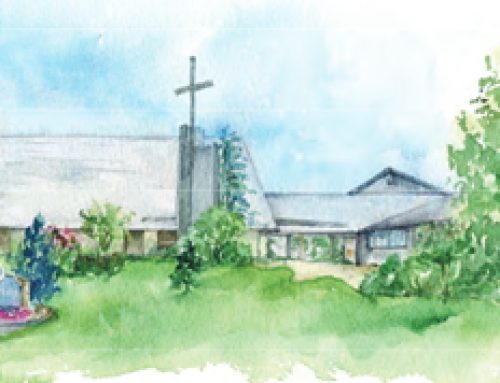FROM THE PASTOR’S DESK
Dear Parishioners,
A Jewish couple living in Texas decided to participate in a cultural exchange program in which Jews from throughout the world came to visit the United States. So, around Christmas time a rabbi from the back woods of Russia showed up to live with them for a while. They wanted to provide the rabbi experiences that he could not have in his native Russia, so they called together some family and friends and took him out to their favorite Chinese restaurant. All during the meal the rabbi was speaking in glowing terms of the beauties of North America. At the end of the meal the owner of the restaurant came forward and presented to each diner a small metal Christmas tree ornament as a token of the season. After the owner left, someone pointed out that on the back of the ornament it was written “Made in India.” Everyone had a good laugh. Then they noticed that the rabbi was crying. His hosts became concerned and questioned him whether he was offended because he was given a gift that was connected to a Christian holiday. But he shook his head, “No, no,” he said, “I’m crying tears of joy, joy to be in a country where a Buddhist can give a Jew a Christmas gift made by a Hindu.”
The tears of the rabbi were holy tears, and in our hearts, we know it. Because regardless of background or religion all people recognize that when those who are different cooperate, when men and women reach across borders that separate them, when divisions are healed, God is at work. The Jewish tradition knew this profoundly. The Jewish Bible begins with God creating all things and making all people in God’s likeness. The Jewish Torah instructs Jews to love and care for the resident aliens, people of other countries who lived in their midst. They were directed to welcome the stranger. Jesus being a good Jew placed this truth at the heart of his message saying that we who welcome the stranger welcome Him. In today’s gospel He uses the image of the shepherd and the sheep, first of all to emphasize His closeness to us and then to make it clear that He has other sheep that do not belong to our fold. In this way He reveals that God’s ultimate intention is to have one-fold and one shepherd.
This vision of a humanity united across its divisions is God’s vision. All too often we see our faith as a way of connecting God to us, and those that we know and love. But God has a broader vision. God’s intention is to extend respect and unity across the entire earth. And this vision is not marginal to the Good News but at its center. Because every vision we have of God’s Kingdom includes all people united in respect and peace.
Now we do not often reflect upon this central part of our faith, because is so much easier, so much more comfortable, just to stick around with the people who are like us—the people who think the way we do, the people who come from the same background and have the same perspectives. It takes an effort to reach out to someone who is different, to accept someone who seems strange to us. Yet our faith calls us to do just that. If the Kingdom is to come, then we must be willing to recognize and to welcome those who are strangers to us.
People who are different surround us regularly. We run into them at work or at school, or when we shop or when we go to the movies. We are constantly rubbing elbows with people who are different: different because of their race, because of their religion, because of their sexual orientation, because of their nationality. We must not forget that God sees us in terms of the way that we see them. Therefore, it is part of our calling to take the decision to reach across the boundary and accept someone who is different, who is a stranger to us.
This can be done in simple ways. We do not have to welcome a Russian rabbi into our home. It can be as simple as smiling to someone who is different from us or offering them a confident “Good Morning.” If the situation allows, we might ask someone, “How was your weekend?” or share with them how our weekend was. These small actions reflect an attitude of openness and welcome. Each time we offer them it is so much more than being an open-minded and nice person. It is taking a step closer to God’s intention for the world, a step closer to building the Kingdom of God.
It is always more comfortable to remain in our own flock, to mill around with sheep that are just like us. But the shepherd whom we love has other sheep. If we intend to serve him, we must be willing to accept those sheep as well. Every time we do so we contribute to God’s intention for the world. Every time we welcome someone who is stranger to us, we move closer to the day when there will be one flock and one shepherd.
Peace,
Fr. Monteleone
To read the complete bulletin click here



